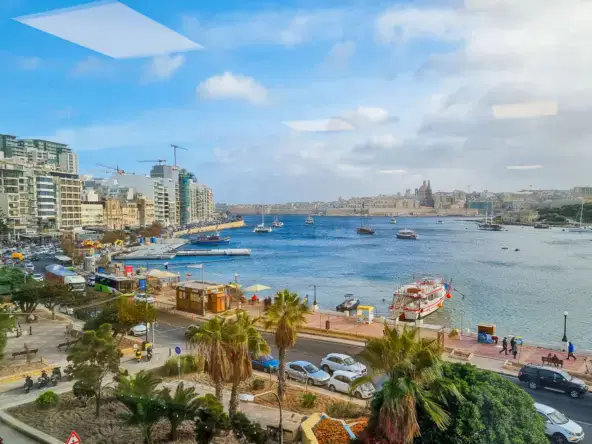Quick overview
St Julian’s has evolved from a quiet coastal village into one of Malta’s most dynamic commercial centres. Choosing an office in St. Julian’s places your business in a location that balances prestige, accessibility, and lifestyle. This blog explores why St. Julian’s is such a popular choice, what to consider before moving and how to secure the right office for your business.
St Julian’s: From Fishing Village to Business District
Once a small fishing community, St Julian’s is now synonymous with Malta’s business and lifestyle scene. The area has transformed dramatically, blending luxury developments with historic charm. Walking along Spinola Bay, you’ll see the old and new side by side: wooden fishing boats anchored near polished yachts, overlooked by the modern skyline that defines Malta’s business scene.
This transformation makes St Julian’s a natural magnet for businesses. Picture this: a team holds its morning strategy session in a glass-fronted office overlooking the bay, takes clients to lunch at one of Malta’s top restaurants, and ends the day with a networking event in a nearby hotel. Few districts offer this mix of work and lifestyle.
Why Businesses Choose Offices in St Julians
Accessibility and International Connections
St Julian’s hosts the highest concentration of five-star hotels in Malta, including Hilton, InterContinental, and Westin Dragonara. For companies with international clients, this is a practical advantage; visitors can stay, meet, and work all within walking distance.
Lifestyle and Entertainment
The district is also Malta’s entertainment hub. From marinas and casinos to gyms, cinemas, and family attractions, St Julians offers an unmatched variety of amenities. For employees, this means more than just an office address; it’s a lifestyle.
Diverse Sub-Areas
Different parts of St Julians suit different business needs:
- Balluta Bay: Quieter and more residential, ideal for boutique agencies and professional firms.
- Spinola Bay: Scenic and lively, popular with creative businesses seeking inspiration.
- St George’s Bay: Close to hotels and retail, a good fit for companies hosting frequent international guests.
- Paceville: Known for nightlife and 24/7 energy. Suitable for sectors like gaming that operate around the clock; but businesses should be mindful of the vibrant environment outside the office.
- Portomaso: A prestigious marina development that blends luxury residences, fine dining, and Grade A offices. A highly sought-after address for financial firms and international companies looking for top-tier facilities.
Advantages and Challenges of St Julians Offices
Advantages:
- Prestige: A St Julians office address enhances company credibility.
- Accessibility: Central location with strong road and transport links.
- Amenities: From luxury hotels to fitness centres, everything is nearby.
- Networking: The presence of international firms fosters collaboration.
Challenges:
- Rental costs: Premium pricing compared to other parts of Malta.
- Traffic and congestion: Especially in peak hours and during summer.
- Seasonality: St Julians becomes busier in summer, which can affect commuting and the overall atmosphere.
- Nightlife factor: In areas like Paceville, 24/7 activity is appealing to some industries but may be distracting for others.
How to Overcome These Challenges
While St Julians does come with certain challenges, there are practical ways to minimise them:
- Managing Costs: Businesses that don’t require a full private floor can consider serviced offices or coworking solutions. These often include utilities, reception services, and meeting rooms within one monthly fee, reducing overheads.
- Avoiding Congestion: Offices closer to the edges of St Julian’s; such as those near Balluta Bay or in Swieqi, offer the benefits of the area while avoiding the heaviest traffic zones. Buildings with underground parking also help ease commuting issues.
- Securing Availability: Smaller businesses can benefit from flexible office arrangements, which allow them to scale up or down as needed without being tied to long-term leases. Larger firms can work with agents early to pre-lease spaces in upcoming developments before they hit the open market.
- Adapting to Seasonality: Companies can plan client visits outside peak summer months or prioritise offices set back from the busiest streets to avoid seasonal disruptions.
By matching office type and location to the company’s priorities, businesses can enjoy the prestige of St Julians while sidestepping many of its downsides.
The Market Context in Malta
While areas like Sliema and Gżira also attract companies, St Julians is considered Malta’s flagship business district. Demand for Grade A office space remains high, particularly in mixed-use developments offering underground parking, sea views, and easy access to hotels.
The market is competitive, with prime spaces quickly snapped up. This benefits landlords with steady yields and reassures tenants that their office address will remain a valuable asset.
Landlord and Tenant Perspectives
- Landlords value St Julians for its strong, consistent demand and low vacancy rates.
- Tenants gain not just an office but a brand advantage; saying your company is based in St Julian’s carries weight with investors, employees, and clients alike.
Featured Offices in St Julians
- Luxury Office For Sale
- St Julian’s Duplex Retail Office
- Saint Julians Office to Let
- 5-Person Serviced Office for Rent
- St Julians Office Space For Rent
Conclusion
An office in St Julians is more than a place to work; it’s a statement. With luxury hotels on your doorstep, world-class amenities, and Malta’s most vibrant business environment, it’s easy to see why companies of every size want to establish themselves here. While challenges like cost, congestion, and seasonality exist, the right choice of office type and sub-area can make all the difference. Discover all that this prime location has to offer through our St. Julian’s office space guide.


